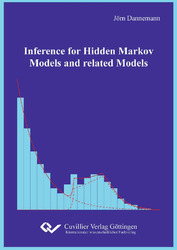| Departments | |
|---|---|
| Book Series (97) |
1382
|
| Nachhaltigkeit |
3
|
| Gesundheitswesen |
1
|
| Humanities |
2372
|
| Medienwissenschaften | 16 |
| Theology | 57 |
| Philosophy | 102 |
| Law | 423 |
| Economics | 853 |
| Social sciences | 417 |
| Sports science | 48 |
| Psychology | 233 |
| Educational science | 190 |
| History | 183 |
| Art | 111 |
| Cultural studies | 166 |
| Literary studies | 117 |
| Linguistics | 89 |
| Natural Sciences |
5408
|
| Engineering |
1798
|
| Common |
98
|
|
Leitlinien Unfallchirurgie
5. Auflage bestellen |
|
Advanced Search
Inference for Hidden Markov Models and related Models (English shop)
Jörn Dannemann (Author)Preview
Table of Contents, Datei (28 KB)
Extract, Datei (120 KB)
Hidden Markov models (HMMs) and other latent variable models form complex, flexible frameworks for univariate and multivariate data structures. In the last two decades models with latent variables have entered almost all fields of statistical applications. It is common for these models that unobserved variables are introduced to model a complex data structure given by the observables. A major advantage of latent structures is the principle simplicity and the accessibility to practitioners as well as their application-driven interpretations rather than black box systems. In this dissertation the statistical methodology of HMMs and related models is extended in certain aspects and illustrated by several applications from various fields, including epileptic seizures, financial time series and a dental health trail.
We first investigate testing problems for HMMs under nonstandard conditions, namely when the true parameter lies on the boundary. In practical applications of HMMs, non-standard testing problems are frequently encountered, e.g. testing for the probability of staying in a certain unobserved state being zero. We derive the relevant asymptotic distribution theory for the likelihood ratio test in HMMs under these conditions. A number of examples with particular relevance in the HMM framework are examined.
Secondly, we are concerned with testing for the number of states in HMMs and switching regression models, in particular, testing for two states in an HMM, and testing for two components in switching regression models. The specification of the number of states is very important in all models with discrete latent variables, and performing statistical testing of such hypotheses is one way to deal with this problem. For testing for homogeneity or for two components in finite mixtures the modified likelihood ratio test is a well-developed method. Based on this approach we propose a test for two states in HMMs. Testing for two states is of primary interest in particular for HMMs, since a two-state HMM represents the smallest non-trivial member of this model class. We derive the asymptotic distribution for the modified likelihood ratio test with independence assumption under the hypothesis of a two-state HMM. In addition, we propose a test for two components in switching regression models with independent or Markov-dependent regime.
In the third part we depart from the classical parametric framework and relax the parametric assumptions, aiming for more flexible models, which reduce systematic errors caused by model misspecification and give rise to model validation techniques. We propose a parametric as well as a semiparametric approach to this problem. In particular, the latter one introduces a new flavor to hidden Markov modeling by linking recently developed semiparametric mixture models to the HMM framework. We discuss identifiability and propose an estimation procedure to semiparametric two-state HMMs based on the expectation-maximization algorithm. This enables extensions of modern estimation techniques in semiparametric mixtures like log-concave density estimation to HMMs.
| ISBN-13 (Printausgabe) | 3869552476 |
| ISBN-13 (Hard Copy) | 9783869552477 |
| ISBN-13 (eBook) | 9783736932470 |
| Final Book Format | A5 |
| Language | English |
| Page Number | 140 |
| Lamination of Cover | matt |
| Edition | 1 Aufl. |
| Volume | 0 |
| Publication Place | Göttingen |
| Place of Dissertation | Universität Göttingen |
| Publication Date | 2010-03-04 |
| General Categorization | Dissertation |
| Departments |
Economics
Mathematics |
| Keywords | boundary, EM algorithm, hidden Markov model, hypothesis testing, identifiability, likelihood ratio test, semiparametric, switching regression, two-component mixture model. |








